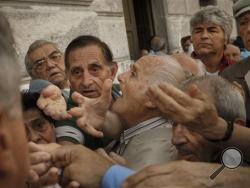ATHENS, Greece (AP) — Crowds of anxious elderly Greeks thronged banks for hours from before dawn Wednesday, struggling to be allowed to withdraw their maximum of 120 euros ($134) for the week, after Greece reopened some banks to help pensioners who don't have bank cards.
The often chaotic scenes came hours after Greece's bailout program with European creditors expired and it failed to repay a debt to the International Monetary Fund, the first developed country to do so. The last country to miss an IMF payment was Zimbabwe in 2001.
The expiry of its bailout and the missed IMF payment left Greece cut off from vital financing and pushed it one step closer to leaving the euro. The IMF cannot lend money to a country that is in arrears.
The eurozone's finance ministers are set to weigh a last-minute Greek proposal for a new aid program, submitted Tuesday afternoon, in a conference call later Wednesday.
Markets appear to have taken in stride the latest developments, with investors still hopeful that a deal may emerge in the days ahead that would prevent Greece from leaving the euro. The Stoxx 50 index of leading European shares was up 0.6 percent while Germany's DAX was 0.6 percent higher.
The deadlines on Greece's bailout and IMF payment expired after a tense weekend during which Prime Minister Alexis Tsipras announced he would put a deal proposal by Greece's international creditors to a referendum on Sunday and urged a "No" vote.
The move increased fears the country could soon fall out of the euro currency bloc and saw Greeks rushing to pull money out of ATMs, leading the government to shutter its banks and restrict banking transactions. Greeks are now limited to ATM withdrawals of 60 euros ($67) a day and cannot send money abroad or make international payments without special permission.
European officials and Greek opposition parties have been adamant that a "No" vote on Sunday will mean Greece will leave the euro and possibly even the EU. The government rejects the argument as scaremongering, and says dismissing creditor demands will mean the country is in a better negotiating position.
However, government officials have begun hinting that the referendum might not go ahead if agreement with creditors is reached this week.
"Look, if a deal is found, there is a chance there could be this possibility too. Everything is developing," Health Minister Panagiotis Kouroumplis said when asked during a morning news show on Antenna television whether the referendum could be called off under certain circumstances.
On Tuesday night, Deputy Prime Minister Yannis Dragasakis hinted the same. The government decided on the referendum, he said on state television, "and it can make a decision on something else."
It was unclear, however, how that would be possible as Parliament has already voted for the referendum to go ahead.
With many elderly Greeks unable to access any money without bank cards, the government said about 1,000 bank branches across the country would open for three days starting Wednesday to give them access to some cash.
But a seeming last minute decision to serve customers on an alphabetical basis, announced by some banks overnight and by others in the morning, led to chaotic scenes of confusion and anger, with many pensioners waiting for hours from before dawn to be eventually told they would have to return Thursday or Friday.
Others were told their pensions had not yet been deposited and they would therefore have to return later in the week.
"It's very bad," said retired pharmacy worker Popi Stavrakaki, 68. "I'm afraid it will be worse soon. I have no idea why this is happening."
Meanwhile, many ATMs had run out of 20 euro notes, meaning the maximum they would dispense per day was one 50 euro note per bank card, effectively cutting the amount of cash Greeks have access to.
Capital controls will remain in place until at least next Monday.
"I don't have a lot of money, but I have to buy medicine. It's important," said 62-year-old Nikolaos Agonatos.
The eurozone's 19 finance ministers to discuss Greece's last-minute proposal Wednesday afternoon, with Jeroen Dijsselbloem, the eurozone's top official, saying the meeting's time was pushed out from the morning at the request of several ministers.
Greece's latest offer involves a proposal to tap Europe's bailout fund — the so-called European Stability Mechanism, a pot of money set up after Greece's rescue programs to help countries in need. It does not include the IMF.
Tsipras' office said the proposal was "for the full coverage of (Greece's) financing needs with the simultaneous restructuring of the debt."
Speaking on a late-night television interview Tuesday, Dragasakis said the new proposal "narrows the differences further" between Athens and its creditors.
"We are making an additional effort," he said. "There are six points where this effort can be made. I don't want to get into specifics. But it includes pensions and labor issues."
On international markets, shares in Japan and Hong Kong rose slightly Wednesday as investors watched to see the next step in the Greek saga.
"International markets appear to have found a level where they are happy to sit and wait on the next developments in the Greek debt crisis. Greece's failure to meet the deadline on its IMF payment looks to have been fully anticipated by markets. Barring unknowns, the next critical event for markets will be the outcome of Sunday's referendum," Ric Spooner, chief market analyst at CMC Markets, said in a commentary.

